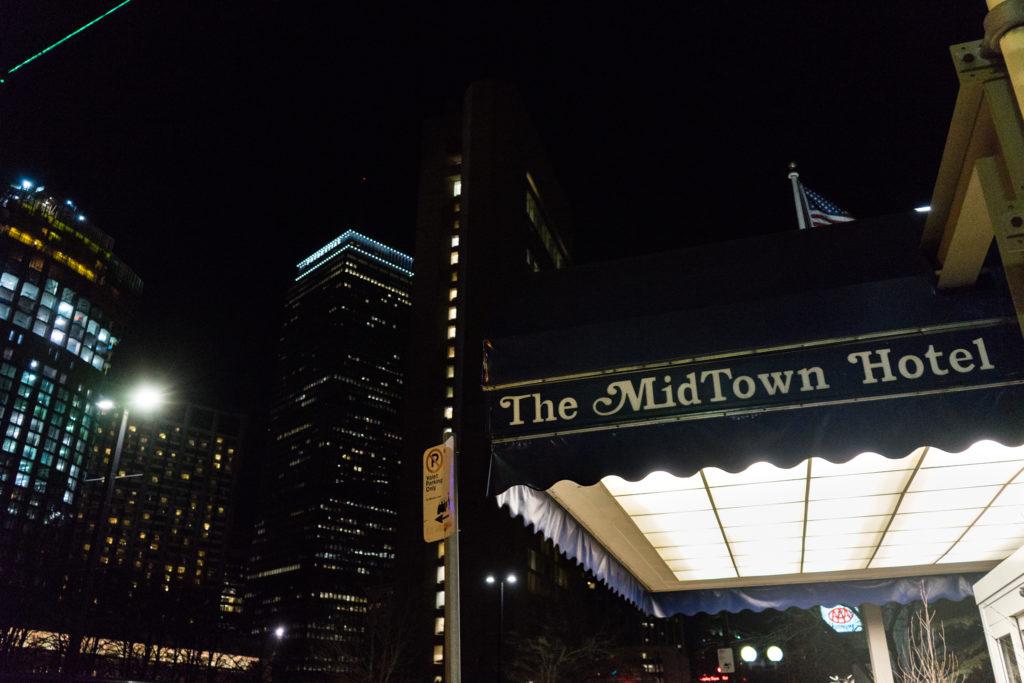ContiNUe students housed in Midtown Hotel
September 20, 2018
For a second semester, students checked into the Midtown Hotel, this time as part of ContiNUe, a transfer program for legacy admits. Despite the university’s initial statement that the Huntington Avenue hotel would only be used for the Spring 2018 semester as overflow housing, the Midtown will now host 36 incoming students for their first year in college.
Northeastern housing services director Francis Bourgeois stated in January that the university did not intend to renew the Midtown contract after its May 2 expiration date. Despite this, students admitted to ContiNUe received information specifying the Midtown as their residential option as early as April 6, according to an email sent to admitted students and obtained by The News.
“As we sit here now, it is a one-semester thing because of the additional influx of students we had this semester,” Bourgeois said at a January 22 town hall on housing. “There are no plans or discussions as we sit here now, at least at my level, for Midtown to be an option in the future.” As far as the news is aware, the original intent was to only house students in the Midtown Hotel for a single semester.
Bourgeois declined to comment on this story.
Northeastern vice president of communications Renata Nyul did not respond to multiple requests for comment on why the university reneged on Bourgeois’ January statement.
Starting the year in ContiNUe
While some students housed at the hotel feel detached from the campus community, many say they greatly value the friendships they have made with other students in the program.
“The one thing I do like about the hotel is the community. It feels like a dorm floor but no one leaves the floor,” said TJ Scanlon, a first-year landscape architecture major. “Everyone is involved and no one is left out. It definitely feels good having friends that I know I’m going to have for a few years. It was a lot easier making friends being in a small community than being a regular Northeastern student.”
A few students, like Brett Donovan, a first-year business administration major, said that getting involved in campus activities is not difficult despite his distance from campus.
“Clearly, we’re in a different community from the rest of the freshmen at Northeastern so we don’t get to know those kids as well,” Donovan said. “But as long as you’re joining clubs and actually participating, not just sitting in your dorm all day, you’re going to meet kids outside of here. It’s really just what you make of it.”
However, students such as first-year business administration major David Lee felt they had to rely on high school friends to broaden their network.
“The only way we can really integrate is that we have friends from our high schools who are regular students so we interact with them and we meet their friends,” Lee said.
Midtown Hotel Reliability
The hotel itself includes advantages as well as drawbacks for the students. For instance, while the location is farther from campus than other freshman dorms, many students were not disappointed by this and even found positives in the situation.
“I’m trying to look at the location in a positive way.” said Sophia Manganiello, a first-year biology major. “For me, it’s good because I’m getting my exercise. I know there are probably dorms that are equally as far because everything is kind of spread out. I don’t mind it, but I’m glad it’s just one year.”
The hotel has a few amenities exclusive to the students, including their own laundry room and recently installed WiFi. However, laundry is one dollar more expensive than on campus, and only payable by credit card, despite the promise of ability to pay with quarters. The Midtown designated a common room for the students during specific times, but, according to Manganiello, the students do not have access to it.
While some students, like Manganiello, would have prefered living in residence halls, the hotel gives them some semblance of a traditional undergraduate experience.
“I just wanted to go to college,” Scanlon said. “It feels more like college than home.”







